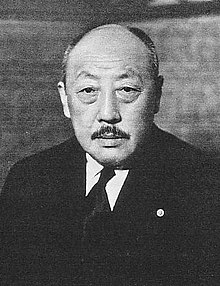Zhang Jinghui
Zhang Jinghui ( Chinese 張景惠 / 张景惠 , Pinyin Zhāng Jǐnghuì , W.-G. Chang Ching-hui ; Zì 叙 五 , Xùwŭ , Hsü-wŭ ; * 1871 in Anshan , Empire of China ; † November 1, 1959 in Fushun , People's Republic of China ) was a Chinese general and politician in the Japanese puppet state of Manchukuo .
Life
Zhang Jinghui was born in Anshan, southwest of Mukden , in the Chinese province of Fengtian . During the Sino-Japanese War , Zhang joined a Honghuzi cavalry militia . After fighting as a mercenary on the Japanese side in the Russo-Japanese War , Zhang joined the troops of General Zhang Zuolin . After the Xinhai Revolution , he became the commander of the 27th Infantry Brigade of the Beiyang Army . When this broke up after Yuan Shikai's death , Zhang went over to the Zhili clique under Wu Peifu . He later returned to Zhang Zuolin and was Minister of War from May 1926 to June 1927 in the Beiyang government, which he controlled . He was then Minister of Economic Affairs until June 1928. Subsequently he was appointed governor of Harbin and was responsible for the local section of the Chinese Eastern Railway . After Zhang Zuolin's murder in the Huanggutun Incident on June 4, 1928, relations between Zhang Jinghui and Zuolin's son, Zhang Xueliang , cooled significantly.
When, after the Mukden incident and the Japanese invasion of Manchuria, the balance of power shifted more and more in favor of the Japanese, Zhang convened a conference on September 27, 1931 and announced the formation of an emergency committee for the special district that would separate Manchuria from China should prepare. After Ma Zhanshan , who was still loyal to the Chinese government, was expelled from the city of Tsitsihar , Zhang declared the city and the surrounding Heilongjiang province independent and was appointed governor of the province on January 7, 1932 by the Japanese who had conquered the city.
Under further pressure from the Japanese, Zhang had to bury his plans to become the ruler of an independent Chinese state in Manchuria and agree to join the puppet state of Manchukuo proposed by the Japanese, in exchange for which he was to keep the post of governor of Heilongjiang. However, his refusal to move from the heavily fortified Harbin to the provincial capital Tsitsihar led to initial tensions with the leadership of the Japanese Kwantung Army . Presumably because of this, Zhang was dismissed from the post of governor when Ma Zhanshan joined the Japanese on February 14, 1932 to become governor and minister of war in the new state. However, when Ma revolted in April of that year, Zhang was able to take over his post as Minister of War.
On May 21, 1935, Zhang succeeded Zheng Xiaoxu as Prime Minister of Manchukuo. This happened at the request of the leadership of the Kwantung army and against the wishes of the emperor Kangde . As prime minister, Zhang was very passive, leaving almost all business to the Japanese government advisers while he turned to Buddhism . Modern Chinese historians today point out that the tofu prime minister , Zhang, contradicted the Japanese only once in his entire tenure over the further sale of Manchurian land to Japanese colonists. In 1943 he was the official representative of Manchukuos at the Greater East Asian Conference in Tokyo . Also in 1943, Time Magazine published an article alleging that Zhang poisoned his family and poisoned several Japanese advisors and government officials before committing suicide. This turned out to be wrong.
Zhang remained prime minister until the state of Manchukuo was dissolved after the Soviet invasion of Manchuria . He himself was imprisoned in Siberia for several years and extradited to the People's Republic of China in 1950 . There he was interned in a re-education camp, where he died of a heart defect nine years later.
literature
- Rana Mitter: The Manchurian Myth: Nationalism, Resistance, and Collaboration in Modern China. University of California Press, 2000, ISBN 0-520-22111-7 .
- Shinichi Yamamuro: Manchuria under Japanese Domination. University of Pennsylvania Press, 2005, ISBN 0-8122-3912-1 .
| predecessor | Office | successor |
|---|---|---|
| Ma Zhanshan | Minister of War of Manchukuo March 1932 to May 1935 |
Yu Zishan |
| Zheng Xiaoxu | Prime Minister of Manchukuo May 1935 to August 1945 |
Dissolution of Manchukuos |
| Zhang Yanqing | Foreign Minister of Manchukuo May 1937 to July 1937 |
Ōhashi Chūichi |
| personal data | |
|---|---|
| SURNAME | Zhang, Jinghui |
| ALTERNATIVE NAMES | Chang Ching-hui |
| BRIEF DESCRIPTION | Chinese general and Manchurian politician |
| DATE OF BIRTH | 1871 |
| PLACE OF BIRTH | Anshan , Liaoning Province |
| DATE OF DEATH | November 1, 1959 |
| Place of death | Fushun |
